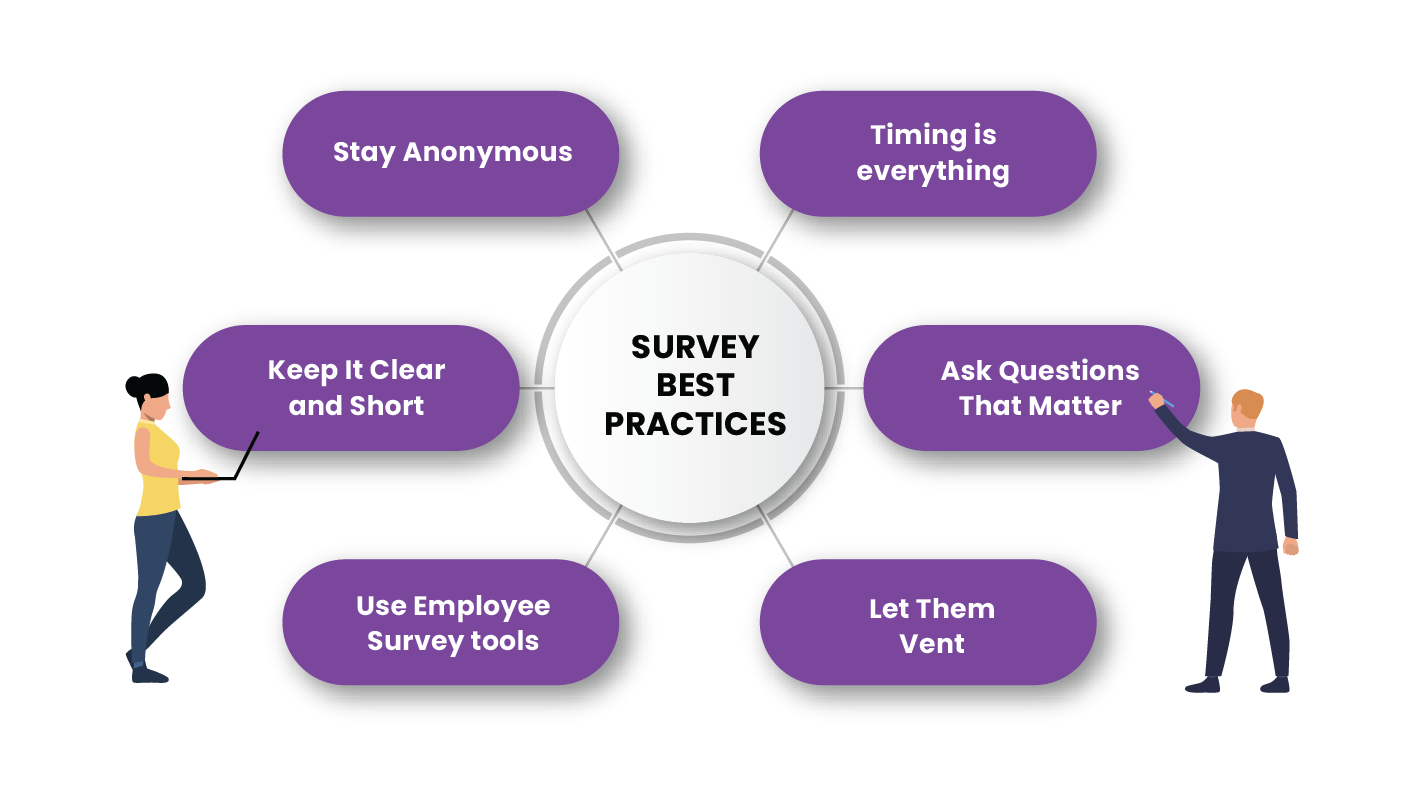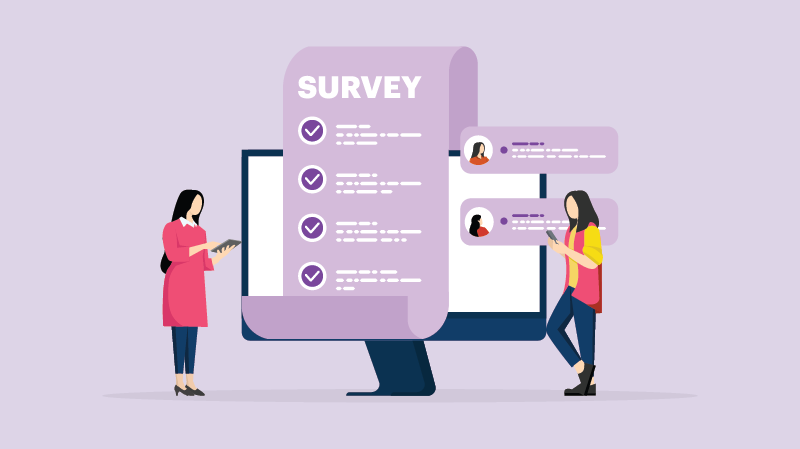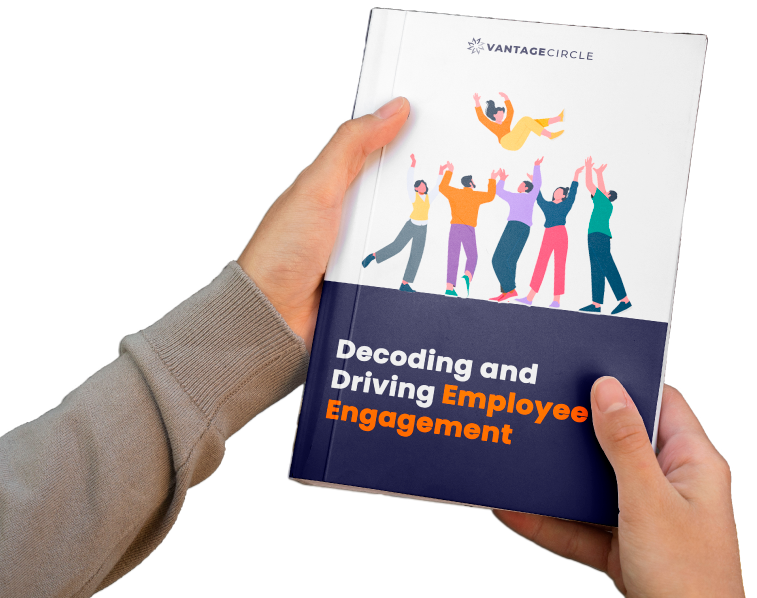35 Return to Work Employee Survey Questions
With the pandemic now over, whether to return to work or continue work from home is a hot topic of discussion.
As per a CNBC report, Goldman Sachs wants employees to attend office five days a week. Google is factoring employees’ in-office attendance into their performance reviews.
A report by Resume Builder, which surveyed 1,000 company leaders says - A whopping 90% of companies plan to implement return-to-office policies by the end of 2024.
HR teams are trying to maneuver through the "remote and hybrid” work schedules at work front. However, the idea to get employees back to office is rapidly getting more popular with many companies looking to end work from home policies. There’s a catch! Employees dont seem to be ready!
People are right when they say that “no one” asked them if they are willing to work from home when the pandemic struck and now that they have settled in that life , they are being dictated to get back!
Return to work mandates are not that simple as they seem on the surface and need to be handled delicately to avoid ramifications.
To ensure a smooth transition, effective return to work surveys with confidential ways of gathering information can be useful.
In this blog we shall elucidate the importance of conducting return to work surveys and the right questions that need to be featured.
Why Conduct a Return-to-Work Survey?

As companies reintroduce their employees into the office, it's important for HR Leaders to lead the transition with empathy, agility, and collaboration, ultimately creating a positive and supportive workplace environment for all.
Return to work surveys play a vital role in acquiring feedback and knowing about employees' desires and difficulties. They ensure there are logical bases for leadership in policy and logistics when moving from remote work. Conducting a return-to-work employee survey gives us the required insights to improve how employees feel about being back in the office whether part-time, full-time or as part of a hybrid working model.
By valuing employee perspectives, organizations can ensure a successful switch.
Here's a brief discussion on why it's important:
Understanding Employee Sentiment: These surveys enable HR leaders to check how ready the employees are for the upcoming transition. By asking targeted questions about their comfort levels, expectations, and any specific challenges they foresee with returning to the office, HR can gain a comprehensive understanding of the collective mindset.
Boosting Employee Engagement: Conducting these surveys promotes a sense of transparency and trust within the organization. It showcases that the company is listening and responsive to employee concerns, pain points and willing to prioritize their well-being. This, in turn, strengthens employee engagement and morale, as individuals feel heard, valued, and respected by their employer.
Informing Decision-Making: Surveys provide HR leaders with insights that can guide policy adjustments, resource allocation, and communication strategies. They allow HR leaders to identify and address potential pain points before they escalate. For instance, survey results indicating a strong preference for flexible work arrangements might prompt HR to consider implementing hybrid work models.
Promoting Transparency and Trust: Surveys demonstrate a commitment to transparency by asking feedback from employees and involving them in the decision-making process. Sharing survey results and action plans with employees communicates transparency and accountability.
35 Return to Work employee survey questions

Here are some example questions to include in a return-to-work survey
Work Model Preferences:
-
On a scale of 1-5 ,how excited are you towards returning to work?
1 - Not at all
2
3
4
5 - very excited
-
Which work model do you prefer: fully remote, hybrid, or in-office?
Fully Remote
Hybrid
In-office
-
How important is flexibility in your work schedule to you?
Extremely important
Very important
Somewhat important
Not so important
Not at all important
-
Do you have any concerns or reservations about returning to work?
Yes
No
If yes, please describe:
-
In the recent past have you worked in office at all?
Once a week
Everyday
Twice a week
Once or twice a month
never
-
How flexible would you like your schedule to be?
Fixed schedule
Some flexibility
Complete flexibility
-
What are your major concerns about returning to the office? (Check all that apply)
Health issues
Decreased flexibility
Decreased productivity while working in the office
Arranging for childcare
Other (please specify)
- What of the following will motivate you to return to office?
Having secured child/elderly care
More social events
Technology support
Office closer to home
Team collaboration
Colleagues
-
On a scale of 1-5 How conducive is your current home environment to working from home long-term?
1 - Not at all conducive
2
3
4
5 - Extremely conducive
-
If you’re prepared to return to the office, will you be available to work the same hours as you did before leaving the office?
Yes
NO
- Have you relocated? Is your move temporary or permanent? How will it affect your ability to return to the office?
I prefer to visit the office:
Daily
Weekly
Monthly
Quarterly
Never
Health and Safety Concerns:
- Are you satisfied with the current health and safety measures implemented in the workplace?
Very satisfied
Somewhat satisfied
Neither satisfied nor dissatisfied
Somewhat dissatisfied
Very dissatisfied
- Have you received proper training on how to follow health and safety protocols at the workplace?
Yes
No
Are you healthy enough to return to work?
- On a scale of 1-5, 5 being the highest, how confident are your that your organization will take all necessary steps to ensure a safe and healthy work environment incase of a pandemic situation again?
Logistics and Practicalities:
-
How did you commute to work before COVID-19?
Public transport
Office shuttle
Car
Bike
Cycle
Walk
Any other(specify)
-
How do you plan to commute after joining back?
Public transport (if it opens up)
Office shuttle
Car
Bike
Cycle
Walk
Any other(specify)
-
What is your living condition?
I live alone
I live with my family
I live with my friends
(others, please mention)
-
Do you have any dependents?
No
Yes, my children
Children and adults
(others, please mention)
-
Do you require any accommodations or support for childcare arrangements upon returning to the office?
-
Are there any specific technology requirements you need to work effectively in the office?
-
What do you miss most about the office?
-
What aren’t you missing about the office?
-
How should we phase the return to the office?
-
Are there any specific tools or resources you believe would facilitate smoother communication and collaboration upon returning to the office?
Communication and Collaboration
-
What are your preferred communication channels for staying in touch with colleagues and supervisors?
-
Have you managed a team before?
Yes
No
-
Do you face any challenge while coordinating with your team?
Yes
No
(Please specify, if Yes)
-
How effective has the communication been with management regarding returning to work?
Very effectively
Effectively
Neutral
Ineffectively
Very ineffectively
-
Have you received adequate support from management during this transition?
Yes
No
Neutral
- What additional support would be helpful to you during this transition?
Mental Well-being and Support:
-
On a scale of 1 to 5, how would you rate your current stress levels related to returning to the office?
-
How do you feel about returning to work? Select all the options that apply.
I feel healthy and energized.
I am confident of getting all the support from the organization during the transition period.
I believe that I will be treated fairly by my co-workers.
I assure you that my issues will not affect my discharge of duty in any way.
_______________________Any other (Please specify)
-
Would you find it helpful to have access to mental health resources or support programs upon returning to the office?
Yes
No
-
Do you feel adequately prepared to navigate any anxieties or challenges associated with the return-to-office transition?
Yes
No
Other
-
Have you experienced any mental health challenges during remote work that you anticipate may change upon returning to the office?
Do you have any other suggestions? We want to make returning to work as comfortable possible.
Best Practices for Designing and Administering Your Survey

Let's make surveying your team a breeze with these simple tips:
Stay Anonymous: Give your team the option to share their thoughts without revealing their identity. This gives them the confidence to be honest without worrying about any fallout.
Keep It Clear and Short: Nobody has the time for long, boring questions. Keep it short and sweet thats easy to understand and doesn't take too long to answer.
Use Employee Survey tools: One highly effective survey tool that stands out is the eNPS or Employee Net Promoter Score. Many organizations offer Pulse surveys that are eNPs-based, ensuring transparent and accurate analysis of employee sentiment.
Timing is everything: Choose a moment when your team isn't super busy or on vacation. You'll get better responses when people aren't feeling overwhelmed.
Ask Questions That Matter: Dont ask for the sake of asking! Make sure your questions give useful info to improve things.
Let Them Vent: Include some questions where your team can write their own answers. This way, they can share any concerns or ideas that might not fit into multiple-choice questions.
With these tips, you'll be on your way to gathering awesome feedback from your team in no time!
Conclusion
To conclude, it's important to have a well-planned journey back to the office.
Right questioning is the core of understanding how workers perceive the idea of going back to the office. By understanding their problems and choices, we may develop the workplace where everyone’s well-being and efficiency are supported. Its essential to communicate, collaborate, and develop a workplace where every individual is heard. We will be happy to hear your thoughts on this trending topic.


















